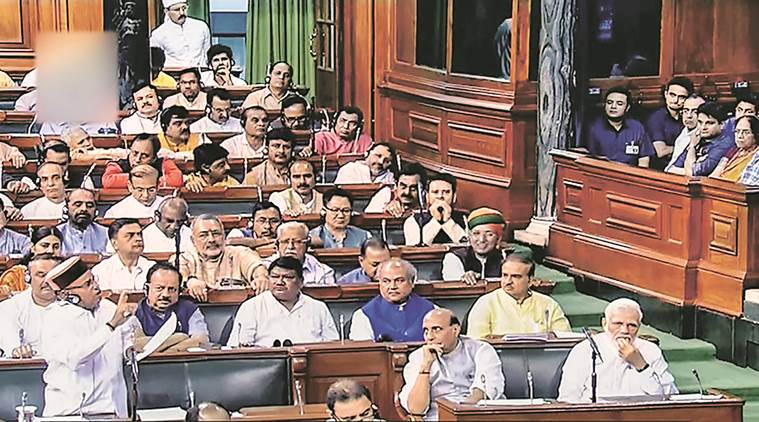 Social Justice Minister Thawar Chand Gehlot speaks in Lok Sabha during the discussion on the Bill on Thursday. PTI
Social Justice Minister Thawar Chand Gehlot speaks in Lok Sabha during the discussion on the Bill on Thursday. PTI
With the Congress undoing its stance taken in the Upper House during the last Monsoon Session, the Bill to grant constitutional status to the National Commission for Backward Classes (NCBC) was passed unanimously by Lok Sabha on Thursday.
The passage of the Constitution (123rd Amendment) Bill, 2017, making NCBC a panel with full powers to safeguard rights and interests of the Other Backward Classes (OBCs), could give a fillip to the BJP’s attempts to posture itself as a party that stands for backward communities. This was evident in the nearly five-hour debate, during which the Congress came under severe attack not just from ruling coalition members but also friendly parties for its “neglect” of backward communities during their governments.
The Lok Sabha passed the Bill, pitched as an “alternative amendment” because it supersedes the amendments passed by the House in Monsoon Session 2017, with 406 members present voting in favour. RSP’s N K Premachandran pointed out that this was first time that an alternative amendment was brought in the Lower House.
When the Bill was taken to Rajya Sabha last year, the Congress-led Opposition had forced certain amendments to it, embarrassing the BJP-led government, which does not enjoy majority in the Upper House. The amendments had increased the three-member NCBC to five members so as give representation to a woman and a person from minority community. It mandated that all five members should necessarily be from OBC communities. Another amendment sought to protect the federal structure by giving states a significant role in making recommendation to the list.
The Lok Sabha voted out an amendment brought in by BJD’s Bhartruhari Mehtab, who wanted the amendment to protect the rights of states in making the list of OBCs. Social Justice and Empowerment Minister Thaawarchand Gehlot assured the House that states will continue to have the rights to prepare the state list, but if they want a certain community in the central list, the Commission will take the final decision.
He said inclusion of a woman in the panel would be ensured when the rules are issued once the Bill is passed.
Prime Minister Narendra Modi, who came to the House during voting on the constitutional amendment, was seen congratulating Gehlot, who moved the Bill.
Gehlot assured the House that the government will take steps to see that two minority universities — Aligarh Muslim University and Jamia Milia Islamia — would provide reservation for SC/ST and OBC students. “The Congress government had declared them as minority institutions (which do not nave to provide quota), but they are central universities,” Gehlot said. “We will see that they are reinstated to their original position.”
Gehlot later told The Indian Express outside Parliament: “The matter is in court. The government has clarified its position, and we will try our best to see that they remain as central universities that grant quota to SC, ST and OBC (students).”
Replying to the debate, Gehlot said constitutional status for the OBC panel had been a long-term demand. “Only the Modi government took steps to grant it. The Modi government has been taking a number of initiatives for the weaker sections. The Union Cabinet has already decided to bring stringent laws to prevent atrocities against SCs and STs,” he said.
Several MPs — Union minister Ram Vilas Paswan, Samajwadi Party’s Dharmendra Yadav and TRS’s B N Gowd among them — criticised the Congress for not taking care of the interests of people from OBC communities. “What have you done for the backward classes,” Paswan asked the Congress. “Why did Rahul Gandhi not make any reference to the SC/ST Bill in his speech during no-confidence motion? You went to the President against the Supreme Court order (on the SC/ST Act), but in this sovereign House you did not talk about it.”
Praising Modi for his initiatives, Paswan said, “Middle class OBCs always distanced themselves from the Congress. Ram Manohar Lohia first raised his voice for them.”
Taking on the Congress, and Rahul’s speech during the no-trust motion, Gowd said, “Had the Congress ‘hugged’ and made ‘eye contact’ with OBCs the party would have understood the pain.” Yadav said the Congress failed to protect OBCs. Both he and Yadav criticised BJP as well.
Defending his party, Congress member Tamradhvaj Sahu said his party never opposed the Bill. Sahu and Malliarjun Kharge, who intervened during the debate, asked why the government took so long to bring back the Bill to the Lok Sabha.
Demand to raise quota past 50%
A suggestion proposed by several MPs was the government should ensure the current quota limit is raised beyond 50 per cent. Lauding Tamil Nadu’s 69-per cent reservation, Shiv Sena’s Arvind Sawant argued that only 12 per cent OBCs get jobs even though they comprise 40 per cent of the population. Jayaprakash Narayan Yadav of RJD asked if Tamil Nadu and Karnataka can have more than 50 per cent reservation, why can it not be extended across the country. “Why are you confining 90 per cent of the population to 50 per cent quota. There has to be an amendment to nullify the Supreme Court order,” AIMIM’s Asaduddin Owaisi said. TDP’s Rammohan Naidu asked why the government always stresses the 50-per cent figure and urged the government to lift the threshold.